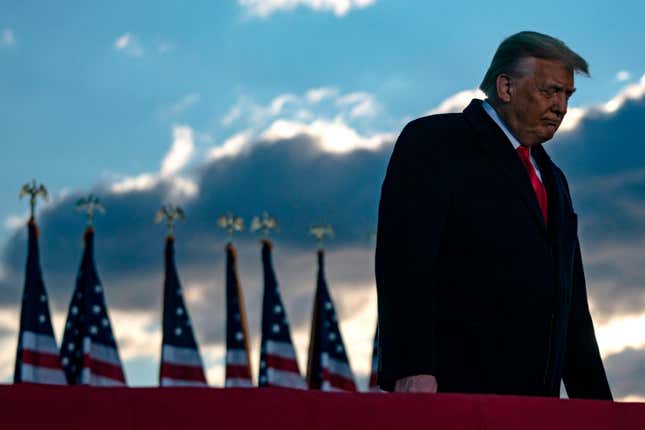
Stop me if you’ve heard this one, but Donald Trump’s presidency was all Russia’s fault.
Yes, I know, Trump supporters: Blah, blah, blah, the Mueller probe didn’t prove shit; blah, blah, blah, “no collusion” *tiny hand gestures*; blah, blah, blah, get over it already, he’s not even president anymore.
While it’s apparently true that the report by former Department of Justice special counsel Robert Mueller didn’t establish sufficient evidence that the Trump campaign colluded with Russia when it interfered in the 2016 presidential race—I mean, there were mad indictments for things like hacking emails, lying to the FBI and obstructing the investigation, but whatever—a new report alleges that Russia spent around 40 years cultivating Trump as an asset and eventually as their man-child Manchurian candidate for the presidency, according to a former KGB spy.
Yuri Shvets, an ex-KGB officer who the Soviet Union had posted in Washington in the 1980s, told The Guardian that Trump was a dimwit that could be easily influenced to parrot anti-western propaganda. (What’s that? Trump is not a very smart person but is great at pushing lies and propaganda? You don’t say.)
“This is an example where people were recruited when they were just students and then they rose to important positions; something like that was happening with Trump,” Shvets, who now lives in Virginia, said over the phone on Monday.
According to The Guardian, Shvets was the main source journalist Craig Unger used for his recently published book American Kompromat: How the KGB Cultivated Donald Trump, and Related Tales of Sex, Greed, Power and Treachery.
From The Guardian:
Unger describes how Trump first appeared on the Russians’ radar in 1977 when he married his first wife, Ivana Zelnickova, a Czech model. Trump became the target of a spying operation overseen by Czechoslovakia’s intelligence service in cooperation with the KGB.
Three years later Trump opened his first big property development, the Grand Hyatt New York hotel near Grand Central station. Trump bought 200 television sets for the hotel from Semyon Kislin, a Soviet émigré who co-owned Joy-Lud electronics on Fifth Avenue.
According to Shvets, Joy-Lud was controlled by the KGB and Kislin worked as a so-called “spotter agent” who identified Trump, a young businessman on the rise, as a potential asset. Kislin denies that he had a relationship with the KGB.
Then, in 1987, Trump and Ivana visited Moscow and St Petersburg for the first time. Shvets said he was fed by KGB talking points and flattered by KGB operatives who floated the idea that he should go into the politics.
The ex-major recalled: “For the KGB, it was a charm offensive. They had collected a lot of information on his personality so they knew who he was personally. The feeling was that he was extremely vulnerable intellectually, and psychologically, and he was prone to flattery.
“This is what they exploited. They played the game as if they were immensely impressed by his personality and believed this is the guy who should be the president of the United States one day: it is people like him who could change the world. They fed him these so-called active measures soundbites and it happened. So it was a big achievement for the KGB active measures at the time.”
I’ll say one thing about Shvets’ recollection: “Extremely vulnerable intellectually” is the most polite way anyone could possibly think of to say that Trump is as dumb as a bag of orange rocks. It’s also not terribly surprising that all the KGB had to do was tickle Trump’s massive ego a little bit to make him an unwitting opp for Russian spies.
Anyway, the report goes on to state that Trump came back to the U.S. from Moscow and went wild spreading conspiracy nonsense that put big ol’ smiles on a lot of Russian faces. He started his mission to run for the Republican presidential nomination and, in September, he took out a full-page ad in the New York Times, Washington Post and Boston Globe titled: “There’s nothing wrong with America’s Foreign Defense Policy that a little backbone can’t cure.”
More from The Guardian:
The ad offered some highly unorthodox opinions in Ronald Reagan’s cold war America, accusing ally Japan of exploiting the US and expressing scepticism about US participation in Nato. It took the form of an open letter to the American people “on why America should stop paying to defend countries that can afford to defend themselves”.
The bizarre intervention was cause for astonishment and jubilation in Russia.
“It was unprecedented,” Shvets said. “I am pretty well familiar with KGB active measures starting in the early 70s and 80s, and then afterwards with Russia active measures, and I haven’t heard anything like that or anything similar—until Trump became the president of this country—because it was just silly. It was hard to believe that somebody would publish it under his name and that it will impress real serious people in the west but it did and, finally, this guy became the president.”
Oh, Shvets; never underestimate American stupidity.
The Moscow Project, which was published in April 2019 by the Center for American Progress Action Fund, found that Trump’s campaign and transition team had at least “272 known contacts with Russia-linked operatives” and at least 38 meetings with said operatives—but, you know, “no collusion.”

